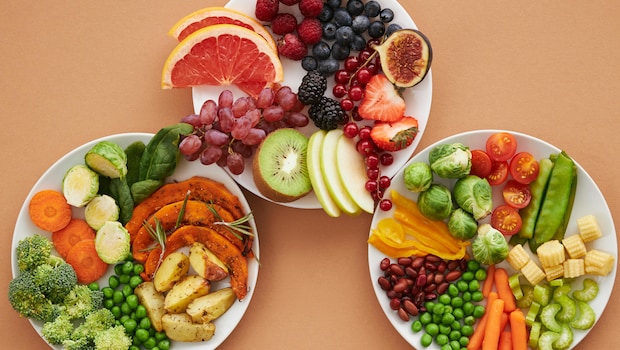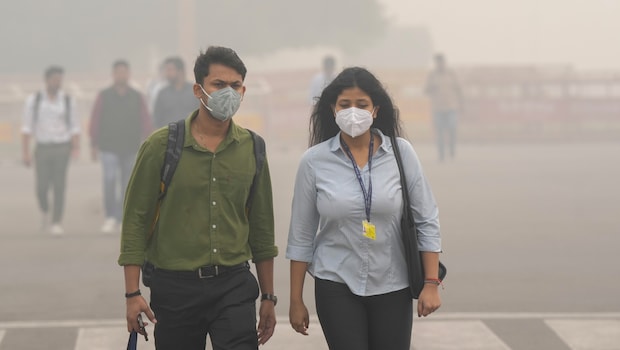- Home/
- Beat Air Pollution With Your Diet - Expert Tips To Boost Your Lung Power
Beat Air Pollution With Your Diet - Expert Tips To Boost Your Lung Power

Highlights
- Ahead of Diwali, rising pollution from crop burning and firecrackers threatens lung health. Experts advise a diet rich in antioxidants, vitamins C and E, omega-3s, minerals, and anti-inflammatory spices to support respiratory resilience.
Festive season is here, and as Diwali approaches, air pollution levels are expected to spike during and after the festival due to crop burning and bursting of firecrackers. This only heightens the urgency to guard our respiratory health from the barrage of pollutants. While avoiding exposure is crucial, what we eat can also play a key role in supporting lung function and resilience. Below, we explore diet-based strategies with input from experts, suggest lung-friendly dishes, and also flag foods to avoid for keeping your lungs healthy.
Here Are 7 Diet Tips To Strenghten Your Lungs From Within
According to nutritionist Dr. Rupali Dutta emphasizes that "the protective antioxidants present in the lining of our lungs fight it out till they are outnumbered, thereafter the pollutants start attacking ... producing free radicals and causing inflammation. The antioxidants from the food you eat can provide protection to your body from harmful effects caused by air pollutants."
Also Read: 10 Foods That Can Help You Breathe Better

Improve your lung health through a good diet.
Here are key nutrients and food groups:
1. Consume More Vitamin C
This water-soluble vitamin helps scavenge free radicals and supports lung tissue repair. Foods rich in vitamin C include citrus fruits (oranges, lemons), guava, papayas, bell peppers, tomatoes, and dark leafy greens (spinach, coriander, amaranth).
Dish suggestion: A refreshing salad of orange segments, diced bell pepper, tomato, coriander and a squeeze of lemon makes a lung-friendly starter. You can also blend a morning smoothie with papaya, spinach and a dash of lemon juice.
2. Eat Vitamin E-Rich Foods
A fat-soluble antioxidant that protects tissues against oxidative damage, vitamin E can come from nuts (almonds, sunflower seeds), seeds, plant oils (sunflower, safflower, rice bran), and spices/herbs like parsley, oregano, basil, and cloves.
Dish suggestion: Toss roasted almonds or sunflower seeds on a warm millet porridge (e.g. bajra kheer) or stir them into vegetable pulao for added crunch and lung benefit.
3. Give Your Beta-carotene / Provitamin A
These compounds, convertible to vitamin A in the body, help control inflammation and protect cell linings. Good sources include carrots, pumpkins, sweet potatoes, radish greens, spinach, amaranth (chaulai), and other greens.
Dish suggestion: A mixed vegetable curry with carrot, spinach and pumpkin (lightly sautéed or steamed) served alongside whole-grain millet or brown rice adds color and lung support.
4. Have Enough Omega-3 Fatty Acids
Omega-3s have anti-inflammatory properties that may mitigate lung stress under pollutant exposure. Sources include walnuts, flax seeds, chia seeds, mustard (rai) seeds, methi seeds, and pulses like kala chana and rajma.
Dish suggestion: A warming bowl of rajma or black chana curry (cooked with mustard seeds and fenugreek) or a chia-flax seed porridge topped with nuts can integrate omega-3 benefits.
5. Don't Ignore Magnesium & Minerals
Magnesium helps relax bronchial muscles and supports respiratory health. Foods like pumpkin seeds, legumes, spinach, avocado, figs, yogurt, and nuts are good picks.
Dish suggestion: Incorporate pumpkin seed-sprinkled dal or spinach and lentil soup; finish a meal with figs or a small bowl of yogurt with a sprinkle of seeds.
6. Have Lots Of Spices and Herbs
Certain herbs/spices like turmeric, garlic, ginger and parsley can contribute anti-inflammatory and antioxidant benefits. Turmeric's curcumin, garlic's allicin, and ginger's gingerol are known for
Dish suggestion: A soothing "golden milk" (turmeric + milk or plant milk) before bed, ginger-garlic soup, or dal tempered with turmeric and garlic can be your daily allies.
7. Eat Jaggery (in moderation)
Jaggery is a natural detoxifier: it may help loosen mucus, soothe throat irritation, reduce inflammation and support respiratory clearance.
Dish suggestion: A small piece of jaggery dissolved in warm water (or ginger-jaggery tea) can be taken in small amounts, especially during high pollution days.
Also Read: 5 Green Foods To Add To Your Grocery List For Health Benefits

It is important to take necessary steps to minimise the effects of air pollution
Sample "day on a plate" (lung-friendly edition):
- Breakfast: Spinach-banana smoothie with a spoonful of chia seeds, and a few almonds
- Mid-morning snack: Orange + handful of walnuts
- Lunch: Mixed vegetable curry (carrot, pumpkin, greens) + millet roti + dal tempered with garlic and turmeric
- Evening snack: Steamed sweet corn or roasted chana + herb-infused ginger tea
- Dinner: Rajma or black chana curry + whole grain rice or millet + sauteed greens
- Bedtime: A cup of warm turmeric milk or jaggery water (small dose)
Foods to avoid (or limit) for lung health
Even as you load up on helpful nutrients, certain foods may worsen respiratory health, inflammation or mucus production. Here's what to watch out for:
1. Refined sugars and high-sugar desserts
Excess sugar intake can promote systemic inflammation, which may worsen respiratory irritation and allergic responses.
2. Highly processed and fried foods
These often contain trans fats, oxidized lipids and additives that may trigger oxidative stress and inflammation in lung tissues.
3. Excessive dairy (for some individuals)
In some people, full-fat dairy may thicken mucus or exacerbate respiratory congestion. (Note: this varies individually; if dairy doesn't cause issues for you, you may include moderate low-fat forms.)
4. High-salt or ultra-salty processed products
Excess sodium can contribute to fluid retention and may strain cardiovascular and respiratory systems.
5. Red and processed meats
Frequent consumption of red/processed meats may correlate with higher respiratory inflammation in polluted environments; leaner proteins (pulses, fish where possible) are better options.
6. Artificial additives, flavor enhancers, preservatives
Some additives or artificial flavors may trigger allergic or inflammatory responses in susceptible lungs.
By consciously choosing antioxidant-rich, anti-inflammatory foods and combining them with protective habits, you can give your respiratory system the reinforcement it needs. Remember: no diet can fully negate heavy pollution exposure, but every meal can be a small act of defense. Stay mindful of what you eat, avoid lung-stressors, and take steps to reduce exposure.
Latest Stories
- Written by Shreya Goswami | Friday February 27, 2026
Rising air pollution in Mumbai is now being linked to 57% of lung cancer cases, the Maharashtra government told the state assembly.
- Reported by Rittick Mondal | Thursday February 26, 2026 , Kolkata
The Mamata Banerjee-led government plans to set up an 800-km long greeen corridor, which will work as a "bioshield" - a forested area that would act as a "Green Wall" - along the Jharkhand border to intercept pollutants entering Bengal.
- Agence France-Presse | Thursday February 26, 2026 , Paris
The United Nations announced the approval of the first carbon credits under a global market aimed at reducing emissions, a mechanism that has faced scrutiny over greenwashing concerns.
- Wednesday February 25, 2026 , New Delhi
Air pollution is a concern not just for Mumbai but for countries and cities around the world, Maharashtra Environment Minister Pankaja Munde told NDTV Wednesday, after the city woke this morning to a blanket of smog for an eighth straight day.
- Reported by Radhika Ramaswamy | Thursday February 26, 2026 , Mumbai
Mumbai woke up to yet another blanket of haze on Tuesday morning, with a grey veil hanging over the skyline from Bandra to South Mumbai.
................................ Advertisement ................................
Latest Videos
Opinion
Blog | Well Done, Delhi. You've Turned Lung Sacrifice Into A Badge Of HonourSaikat Kumar Bose
Monday November 10, 2025Till some years back, Delhiites would ask angry questions to those in power about the capitals annual tryst with toxic air. This has changed. Those in the driving seat dont see the need to answer now.
Opinion | Why Indians Have Just Given Up On Air Pollution CrisisTanushree Ganguly
Friday December 20, 2024While some may argue that people in Delhi are now more aware of air pollution than they were a decade back, my rebuttal would be that awareness does not mean that people are concerned.
Opinion | You Must Outrage Over Filthy Air More Than Once A YearJyoti Pande Lavakare
Tuesday December 10, 2024Delhi welcomed us with monsoon rains and mangos. We were home. Fast forward a couple of years, in the winter of 2012, I found myself in denial about something other parents, mostly expats, were calling toxic air.
Opinion | Delhi's Air Pollution Situation Is Like A Bad MarriageNishtha Gautam
Friday November 22, 2024On a good day, such as today, the AQI reading in Delhi is 407. We are jubilant at the sickly sunshine trickling through the slightly dissipated smog. At least its not 1600.
दिवाली... पराली... सियासी जुगाली!Ashwini kumar
Monday November 18, 2024दिल्ली-एनसीआर में प्रदूषण का समाधान तो आज तक मिला नहीं. हर साल चिंतित होकर हम-आप सांसों की तकलीफ के साथ-साथ दिल और ब्लड प्रेशर के मरीज भी क्यों बनें?


















